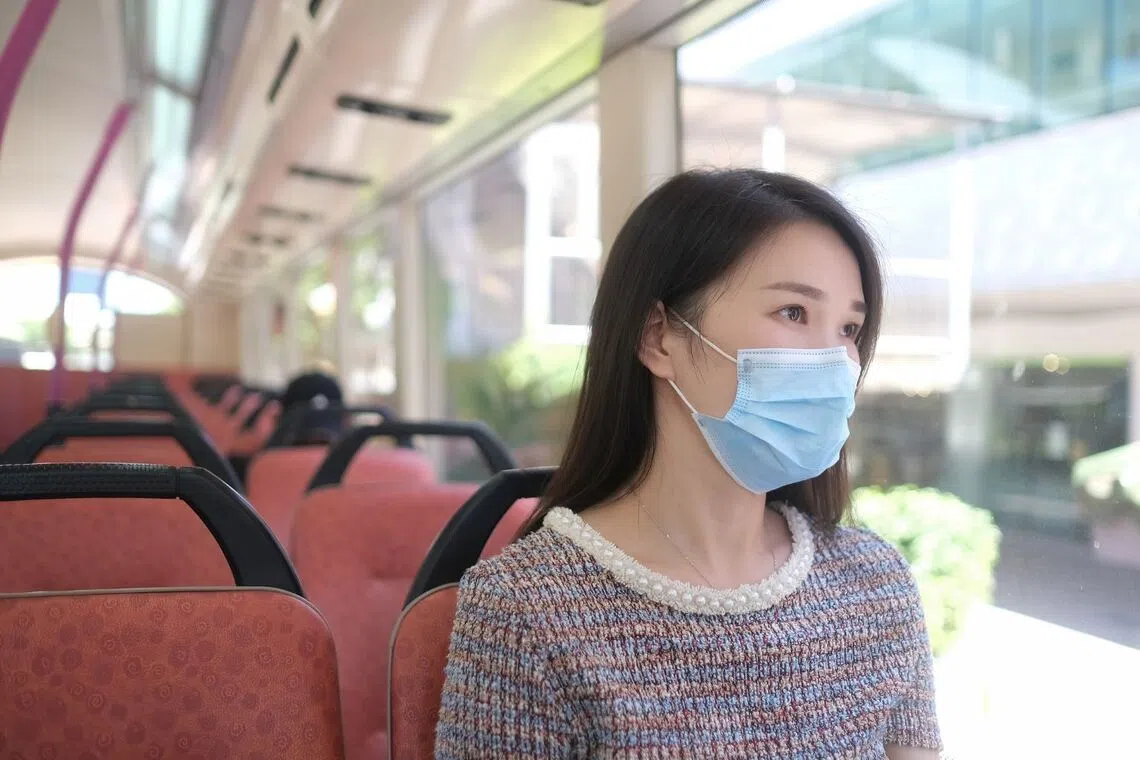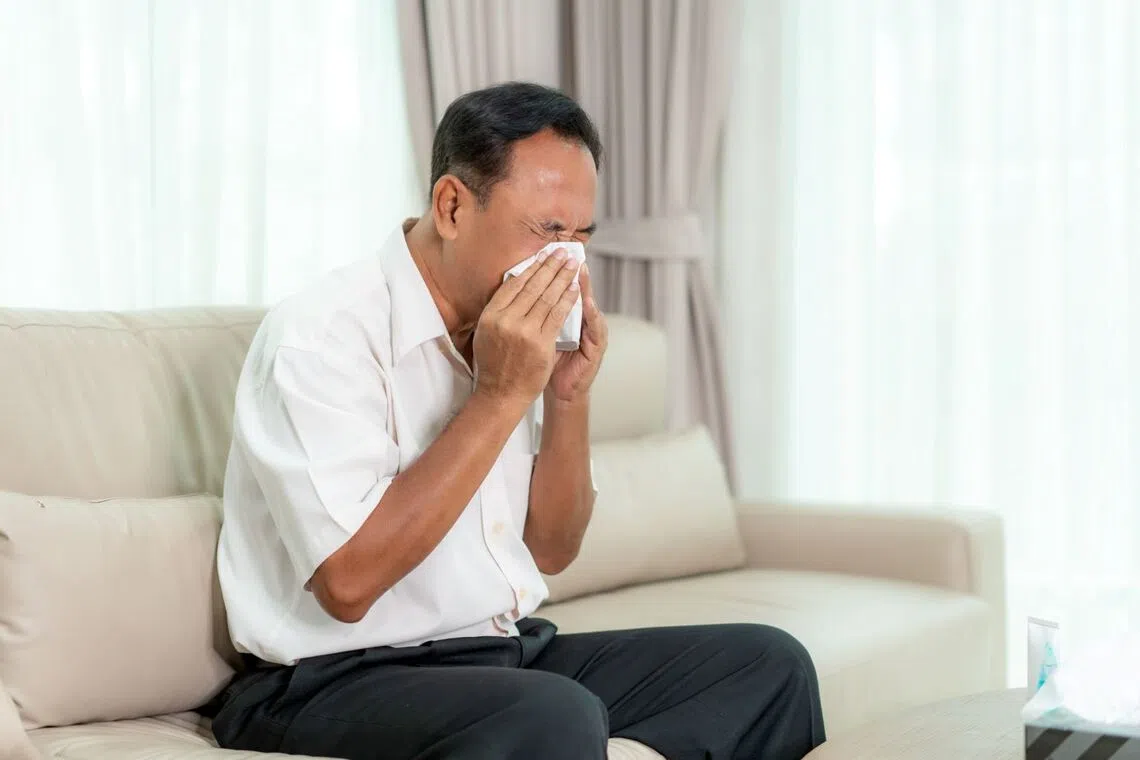Branded content
‘Covid-19 is still a force to be reckoned with’: Why medical experts recommend up-to-date protection
As new variants of the virus surface and the body’s immunity wanes over time, doctors stress that keeping up with preventive measures is still important – especially for the elderly and vulnerable

Doctors say Covid-19 variants are still emerging but herd immunity levels in the community have fallen over time.
PHOTO: GETTY IMAGES
When a 70-year-old public speaker suddenly collapsed on stage, all the medical tests came back negative – until a Singapore specialist uncovered the hidden culprit five days later: Covid-19.
“He had the prodromal symptoms, the flu and a runny nose that were the early warning signs of Covid-19. The infection weakened him and caused him to collapse,” says Dr Asok Kurup, a visiting consultant at the Department of Infectious Diseases at the Singapore General Hospital (SGH).
Since 2020, he has been a member of the Health Sciences Authority’s panel of infectious diseases experts for Covid-19. In April, he was appointed to the inaugural Board for the Communicable Diseases Agency led by the Ministry of Health (MOH).
“Covid-19 is not gone, it is still around,” Dr Kurup says.
“It is not just causing mild infections but it may also be causing problems in people who are old and who have many medical problems.”
As public concern about Covid-19 eases significantly, the vaccination rate for Covid-19 has also fallen.1
Dr Kurup warns against complacency as herd immunity levels in the community have dropped over time, but new SARS-CoV-2 variants – such as the LP.8.1 strain – are still circulating. For some groups of people, it results in severe symptoms.
For some people, the complications of Covid-19 may not only be limited to the initial infection of the virus. Citing recent studies2,3, Dr Kurup says that people infected with Covid-19 are at a higher risk of experiencing a cardiovascular event, hence it is important for the medically vulnerable to protect themselves from getting infected.4
Singapore saw its most recent surge in Covid-19 cases in the week of Apr 27 to May 3, 2025. During that period, the estimated number of Covid-19 cases was 14,200, up from 11,100 in the previous week
Elderly patients with existing conditions are often hit hardest.
Dr Kurup personally saw three such cases at SGH. Two of them, one in their 60s and the other in the 70s, were end-stage renal failure patients, with one of them on dialysis. They both had to be put on mechanical ventilators to help them breathe. The third patient needed respiratory support.
At his private clinic in Hougang, general practitioner (GP) Dr Leong Choon Kit says there is resistance among elderly patients to be vaccinated against Covid-19, while younger people believe they do not need any more protection.
He recounted the story of an 86-year-old woman with a heart condition and other co-morbidities, including high blood pressure, cholesterol and osteoarthritis.
The frail, wheelchair-bound patient contracted Covid-19 in June this year. When the anti-viral regime Dr Leong prescribed did not work, she had to be hospitalised.
She had received the flu and the pneumococcal vaccines from his clinic earlier in June, but turned down the Covid-19 vaccination then.
“I followed up with her after she was discharged from hospital and she expressed regret that she did not get the Covid-19 vaccination,” says Dr Leong.
Two weeks after her discharge, her son, who takes care of her, went to Dr Leong's clinic to discuss about Covid-19 vaccination.

A Covid-19 infection could lead to damage to the body and may result in prolonged weakness.
PHOTO: GETTY IMAGES
Dr Leong hopes that more people learn from this example and discuss about Covid-19 protection with their doctor.
“For people who are not vaccinated, when they suffer an infection, there could be damage to the body,” he says. “In some cases, even after recovery there could be some prolonged weakness.”
He stresses that protection should be discussed, especially in multi-generational households that include grandparents, parents and children.
Both he and Dr Kurup encourage everyone to keep up with their Covid-19 protection as one in five Singaporeans are now aged 65 and above
The Communicable Diseases Agency in Singapore announced on Oct 24 that updated Covid-19 vaccines are now available
“Many of us live with others so when we make decisions, we have to take into account how we are going to impact the people who are vulnerable because we can transmit Covid to them,” says Dr Kurup.
Long Covid remains a concern
Five years after the first cases of Covid-19 surfaced in end 2019, GPs like Dr Leong are seeing patients suffering the long-term effects of the disease, also known as long Covid.
The most common no specific drug treatment
“Long Covid is a real thing and we are seeing some patients with weaker lungs whom we may have to prescribe inhalers to treat the symptoms, for example," Dr Leong explains.
Dr Kurup points out that long Covid affects separate groups of patients differently.
“There is good evidence from around the world that shows if you prevent severe Covid, you can mitigate the risk of long Covid,” says Dr Kurup.
Covid vaccinations are still free for Singaporeans and permanent residents
Currently, the MOH recommends three groups of people
With updated vaccinations available now for free at selected polyclinics and private GP clinics under the Covid-19 National Vaccination Programme, Covid-19 protection can be easy and accessible for those aged 6 months and above.
For the elderly, the frail and people living with chronic diseases, Dr Kurup recommends a “holistic care approach” and need for protection against Covid-19, influenza, pneumococcal disease and respiratory syncytial virus (RSV) disease.
Dr Leong advocates for his patients to receive their vaccinations in a single appointment whenever feasible, for their convenience. He emphasises that patients should always speak to their physician to understand which vaccines are recommended and appropriate for them.
The doctors’ message is clear: Because Covid-19 has never gone away and new variants emerge, it remains important to stay protected.
“Covid-19 in the foreseeable future is still a force to be reckoned with,” says Dr Kurup. Find out more about Covid-19 protection.
Footnotes:
1 MOH. Update on Covid-19 Situation
2Lim J T et al.;2024; Long term cardiovascular, cerebrovascular and other thrombotic complications in COVID 19 survivors: A retrospective cohort study
3Wee et al.;2024; Long term cardiovascular, cerebrovascular and thrombotic complications after SARS COVI-2 omicron infection: a retrospective cohort study
4 MOH. Changes to Covid-19 Vaccination Precautions and Recommendations
The information is for educational purposes only and based on healthcare professionals’ opinions. The content in this article cannot be used in place of a consultation with a medical professional nor a basis of self-diagnosis or for treatment decision. Only your doctor can provide you with accurate diagnosis and appropriate treatment.



